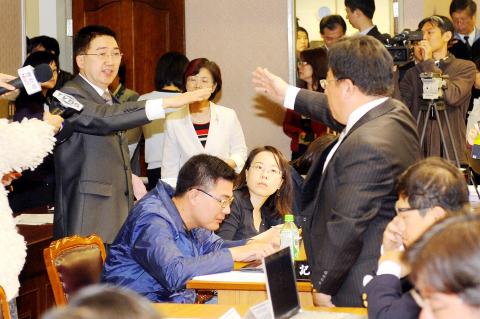|
Oversight bill lacks teeth, academics say
LEGISLATIVE REVIEW: Critics of the government bill on monitoring cross-strait pacts say it gives too much power to the Cabinet at the expense of the legislature
By Shih Hsiu-chuan / Staff reporter

Chinese Nationalist Party (KMT) legislators boycott the legislature’s Internal Administration Committee’s public hearing yesterday, which was being held to discuss a draft bill for monitoring cross-strait agreements.
Photo: Chen Chih-chu, Taipei Times
The oversight bill proposed by the Executive Yuan fails to address concerns over the lack of legislative and public supervisory mechanisms for cross-strait agreements, a central demand of the Sunflower movement, academics said yesterday.
Democratic Progressive Party Legislator Chen Chi-mai (陳其邁) yesterday called a hearing at the legislature’s Internal Administration Committee to discuss issues related to the institutionalization of oversight mechanisms for cross-strait negotiations.
If enacted, the bill proposed by the Cabinet would deprive the legislature of the right to scrutinize cross-strait agreements that the Executive Yuan thinks do not need legislative ratification to take effect, said Chiang Huang-chih (姜皇池), professor of international law at National Taiwan University.
When a decision on whether a cross-strait deal is subject to legislative review is left to the Executive Yuan’s bureaucratic discretion as the oversight bill has stipulated, “things could be worse than they are now,” Chiang said.
The government can take advantage of this loophole to bypass legislative review by drafting the agreement in such a way that it does not require any legal amendments or any new legislation, Chiang said, citing as an example a military agreement on Taiwan downsizing its military force and China withdrawing missiles targeting Taiwan.
Chiang said the Executive Yuan drafted the bill “with evil intent.”
The oversight bill calls for the Executive Yuan to communicate better with the Legislative Yuan and the public on cross-strait negotiations before, during and after such agreements are signed, and to establish a mechanism to examine how deals would affect the country from a national security perspective.
Raymond Sung (宋承恩), a legal adviser to the Overseas Fisheries Development Council and a doctoral candidate at Oxford University, said the Sunflower movement has one important message: that cross-strait policies must be enacted under public and legislative supervision.
After the oversight bill passes the legislature, the government will have to deal with cross-strait negotiations and agreements in a different way than what has been termed its “black-box,” or opaque, handling of the cross-strait service trade agreement, which was at the center of the movement, he said.
Hsu Chung-hsin (許忠信), a law professor at National Cheng Kung University, said the service trade agreement — a follow-up to the cross-strait Economic Cooperation Framework Agreement (ECFA) — should be regarded as a deal signed under the WTO umbrella since Taiwan and China are both members of the global trade body.
The oversight bill would restrict the legislature’s power to review cross-strait agreements because the government regards a cross-strait agreement as either an administrative order or a deal as defined by the Act Governing Relations Between the People of the Taiwan Area and the Mainland Area (台灣地區與大陸地區人民關係條例) — which “is completely and utterly false,” Hsu said.
Hsu said the legislature has the right to strictly review any agreement the government signs with a WTO member that would affect public interests, national security and the nation’s sovereignty clause-by-clause.
Meanwhile, Mainland Affairs Council Minister Wang Yu-chi (王郁琦) criticized the version of the bill proposed by the Democratic Front Against Cross-Strait Trade in Services Agreement — one of the groups leading the ongoing legislative siege —saying it violates the principle of separation of power in the Constitution, which gives exclusives power over foreign trade activities to the executive branch.
The group’s proposal would require a 90-day consultation period with the legislature and legislative approval of the government’s plan to ink a deal with China before negotiations begin, as well as a 180-day period for civic groups to assess a proposed agreement after completion of negotiations and prior to the signing of the deal.
Just because the executive branch is constitutionally endowed with the power to negotiate international agreements does not mean the legislature and the public do not reserve the right to oversee such deals, said Chiou Wen-tsong (邱文聰), an associate research professor at Academia Sinica Institutum Jurisprudentiae.
Chung Yuan Christian University associate professor of law Hsu Wei-chun (徐偉群) said the proposal follows the same principles as those in South Korean legislation governing trade treaties, including ensuring public participation in the review of such pacts, legislative power to review the deals, human rights protection, information disclosure and stipulations on the government’s responsibilities.
source: Taipei Times
|